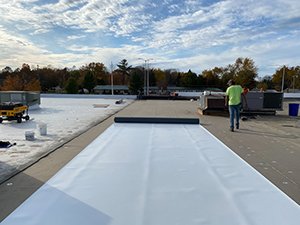Which Single-Ply Roofing System is Best?

When it comes to commercial roofing, single-ply roofing has become one of the most popular and reliable options. Known for its ease of installation, cost-effectiveness, and durability, single-ply roofing offers a variety of benefits for building owners. Whether you are constructing a new building or re-roofing an existing one, understanding the advantages and types of single-ply roofing can help you make an informed decision about your roofing needs. Our team at SES Commercial Roofing in Kingsport, Tennessee, can help! Call us now on 877-913-1389.
What is Single-Ply Roofing?
Single-ply roofing is a type of roofing system that uses a single layer of synthetic membrane to cover the roof surface. Unlike traditional multi-layer roofing systems, which consist of multiple materials such as felt, asphalt, and gravel, a single-ply roof is made from a single sheet of durable material, making it a lighter and more streamlined option for both new construction and roofing replacement.
Benefits of Single-Ply Roofing
Cost-Effective
One of the main reasons building owners choose single-ply roofing is its affordability. Since it requires fewer materials and less labor for installation compared to traditional multi-layer roofing systems, single-ply roofing is a budget-friendly option. Additionally, many single-ply systems are energy-efficient, which can lead to savings on energy bills over time.
Ease of Installation
Single-ply roofing systems are relatively quick and easy to install. The membrane comes in large sheets, which reduces the number of seams and the overall installation time. This also minimizes the chances of mistakes or leaks, as fewer seams mean fewer points of vulnerability. Installation methods can include mechanical fastening, ballasting, or adhesive bonding, allowing for flexibility in installation depending on the building structure.
Durability

Single-ply roofs are known for their long-lasting performance. Depending on the material used, they can withstand a variety of weather conditions, from intense sun exposure to heavy rainfall and snow. For example, EPDM roofs are highly resistant to UV rays and ozone, while TPO roofs are known for their heat-reflective properties that help reduce the urban heat island effect. PVC roofs are excellent for areas with chemical exposure due to their resistance to oils and solvents.
Energy Efficiency
One of the most significant advantages of single-ply roofing is its energy efficiency. Many single-ply materials, especially TPO and PVC, have reflective properties that help keep the building cool by reflecting the sun’s rays. This can reduce cooling costs during the summer months. Additionally, some single-ply membranes are designed to be installed with additional insulation, improving the building’s overall thermal efficiency.
Low Maintenance
Once installed, single-ply roofs require minimal maintenance. They are resistant to cracking, shrinking, and blistering, which are common issues with traditional roofing materials. Occasional inspections to check for debris or damage are usually sufficient to keep the roof in good condition. In case of damage, repairs are straightforward, and the roof can often be patched without the need for a full replacement.
Types of Single-Ply Roofing Systems
There are several types of single-ply roofing systems, each with its own unique characteristics and benefits:
EPDM Roofing
EPDM, or Ethylene Propylene Diene Monomer, is a synthetic rubber roofing membrane that has been used for decades. It is known for its flexibility, UV resistance, and ability to withstand extreme temperatures. EPDM roofs are typically black, which helps absorb heat, but they can also be found in white for improved reflectivity.
TPO Roofing
Thermoplastic Polyolefin (TPO) is a popular single-ply roofing material due to its reflective properties and energy efficiency. TPO roofs are typically white, which helps reflect UV rays and reduces heat buildup in the building. TPO is also known for being resistant to mold and algae growth, making it a great choice for hot and humid climates.
PVC Roofing
Polyvinyl Chloride (PVC) is a plastic-based single-ply roofing material that is highly resistant to chemicals, oils, and extreme weather conditions. PVC roofs are typically white and are often used in buildings where the roof is exposed to harsh chemicals or environmental contaminants, such as factories or industrial buildings.
Single-Ply Roofing Professionals
Single-ply roofing is an excellent choice for commercial buildings in Kingsport, Tennessee, due to its affordability, durability, and energy efficiency. With various materials such as EPDM, TPO, and PVC to choose from, building owners can select the best option to meet their needs and budget. If you are considering a new roof for your commercial property or need to replace an old roof, a single-ply roofing system is an investment that will pay off eventually with its minimal maintenance requirements, extended lifespan, and energy savings. Call our team at SES Commercial Roofing today on 877-913-1389 and get your free estimate.
FAQ
What makes single-ply roofing ideal for Kingsport, TN?
Its durability, energy efficiency, and cost-effectiveness suit Kingsport’s climate and commercial building needs.
Can single-ply roofing help lower energy bills?
Yes—TPO and PVC membranes reflect sunlight, reducing cooling costs, especially in warmer months.
Which single-ply material is best for my building?
EPDM is great for UV resistance, TPO for reflectivity, and PVC for chemical-heavy environments—SES Roofing can help you choose.
How long does single-ply roofing last?
With proper installation and minimal maintenance, single-ply roofs can last 20–30 years or more.
